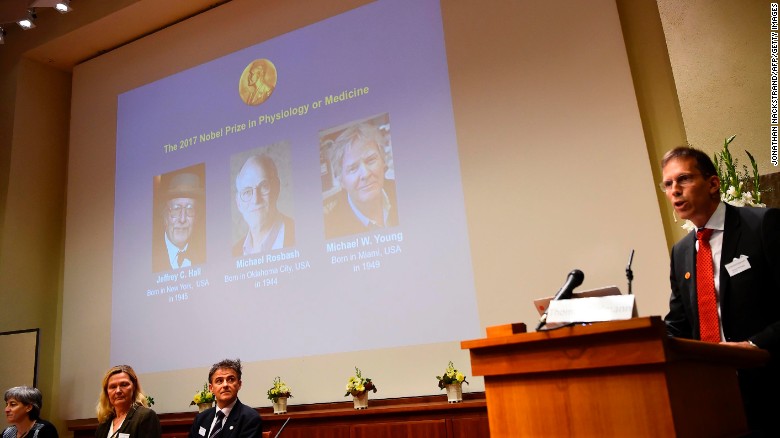US scientists awarded Nobel in medicine for body clock insights
(CNN)Three US scientists have won the Nobel Prize in Physiology or Medicine "for their discoveries of molecular mechanisms controlling the circadian rhythm," otherwise known as our biological clock, the Nobel committee said.
Jeffrey C. Hall, Michael Rosbash and Michael W. Young were awarded the prize for their research on how plants, humans and animals adapt their biological rhythm to synchronize with our planet's day and night cycle, as the earth rotates, in order to control their daily life.
Hall spent most of his career at Brandeis University in Massachusetts, where Rosbash still works as a faculty member. Young works out of Rockefeller University in New York. The winners will share a prize of 9 million Swedish kronor, which is around $1.1 million.
All living organisms on Earth have an internal clock, known as the circadian rhythm, which in humans underlies why we are awake during the day and sleep at night.
But our biological clock also helps regulate eating habits, hormone release, blood pressure and body temperature.
The US trio used fruit flies to discover a gene that controls this everyday rhythm and further showed that the gene encoded a protein which "accumulates in the cell during the night and degrades during the day," to regulate this cycle, the committee said in a statement.
According to the Nobel committee, a person's well-being is affected when there is a "temporary mismatch between our external environment and this internal biological clock."
For example, disruption to our clocks when someone travels across a number of time zones results in jet lag.
The committee explained how an imbalance between lifestyle and rhythm could lead to increased risk for a number of diseases including metabolic diseases, such as diabetes and cancer, and neurodegenerative diseases, such as Alzheimer's disease.
Researching fruit flies
The research rewarded with this year's prize built on the work of scientist Seymour Benzer and his student Ronald Konopka in the 1970s. The pair highlighted how mutations in an unknown gene disrupted the circadian clock of flies, naming the gene "period."
Sacrificing sleep? Here's what it will do to your health
Using fruit flies to investigate this further, this year's Nobel Laureates set out to reveal how this gene actually works -- and in turn controls the body clock. They managed to isolate the period gene and soon discovered that levels of the protein this gene encodes, PER, increase during the night and degrade during the day, highlighting that the protein fluctuates over a 24 hour cycle.
They then went on to discover the role of another gene, called "timeless," which encodes a protein called TIM, that works in combination with the PER protein to regulate the activity of the period gene and in turn the levels of the PER protein -- enabling this 24-hour oscillation.
News Courtesy: www.cnn.com












